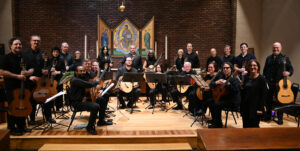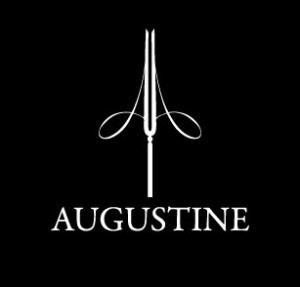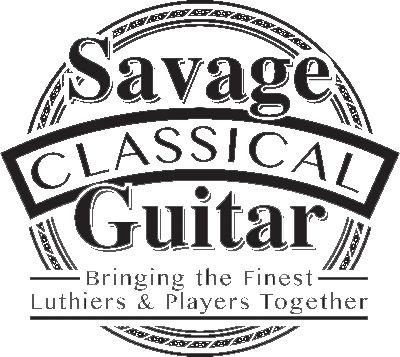by J. Andrew Dickenson
April 2008
Hailed as a “rising star” in the music world, Gyan Riley has been carving a unique path as a musician with his adventurous compositions and virtuosic technique. Armed with a new CD of original compositions, Melismantra, Riley visits the NYCCGS stage in June for an exciting evening of solo guitar music.
NYlon Review: Since your father is a composer, you must have been exposed to music at an early age. What were your early experiences with music like?
Gyan Riley: He was deeply immersed in his studies of North Indian vocal raga when I was very young, so my earliest musical memories are of that. I remember going to sleep listening to a specific raga recording every night. My father gave an honest attempt at teaching me piano when I was three or four, but I was way too stubborn and so that didn’t really work out. My brother was playing the violin, and having older brother envy, I started asking to have a crack at it. I ended up studying Suzuki violin for five years. I think Suzuki is great for ear development and technique, but violin ultimately wasn’t my thing.
When did you begin to play guitar?
In a sense, guitar chose me, actually. I won my first guitar when I was eleven in a raffle at the local music shop. I already had a keen interest in guitar, but it wasn’t until that fortuitous event that my folks allowed me to make the switch (a decision that may have been oiled by the fact that the prize included four free lessons). It was also clear from the get-go that I was going to stick with it. They could hardly wrestle it from my hands.
What inspired you to start composing?
That really began when I developed a fairly serious case of tendonitis my second year in college. I had it so bad I couldn’t play at all without a lot of pain, and composing was something I could do without the instrument. What little time I did spend on the guitar was mostly improvising (because I could avoid the movements that hurt the most), which also brought about some simple little compositions.
How would you describe the music you write?
That depends on the piece, and when it was written. For example, the music on my first CD is very different from that of the new one. But in general most of my solo guitar compositions are fairly difficult. I’ve been influenced heavily of course by Indian music, but also West African music, jazz, Western Classical music (especially Bach), and even to a certain degree flamenco.
Tell me about your new CD.
Well, I spent five years writing, learning, recording, mixing, and producing the music. It’s almost entirely ensemble composition. There are two pieces written for nine guitars, including electric guitar, bass guitar, and steel string guitar. I just multi-tracked myself playing all the parts until it sounded right to me. It’s an interesting process, hearing how a piece comes together from the ground up like that. I also had the good fortune to work with three incredible musicians: Tracy Silverman on electric violin, Scott Amendola on drums, and the amazing Zakir Hussain on tabla.
Do you feel the music on this CD is a new direction for you? How does this music differ from your music in the past?
Yes. Over the last several years, I have shifted my focus toward improvisation, and the recording definitely features a lot of that.
You’re not just a “guitar composer,” in that you write for many other instruments. Does being a guitarist affect the way you write for other instruments?
Probably! But I try not to let it. There’s a tricky balance between trying to bring out the essence of a given instrument and yet not falling into idioms, and not resisting stretching its parameters.
You recently wrote a piece for the Paul Dresher Ensemble.
Well, I’m still writing it, so I really can’t say much definitively about it. Paul approached me about writing something for his ensemble in 2005. I had heard his group before and their unique sound left an impression on me. They all have acoustic and electric/snythesized capability, so obviously the options are vast. They will premiere it in September, so more on that soon . . .
How do you feel you have grown, both as a composer and a guitarist?
Compositionally, I suppose I’m developing a capacity for experimentation and learning from the things that don’t work. I used to be so obsessed with having every note perfect at every point in the process, and that doesn’t always facilitate the best outcome. Now I’m more focused on just letting things happen the way they seem to want to, and tweaking as necessary after the fact. I guess the same is more or less true with my playing. Improvisation has really helped me to succumb to the forces out of my control, and align myself with those powers rather than fight them. Forcing anything in music always feels unnatural to me, and the more I loosen my grip the more the music breathes.
You have a new trio.
The trio is my latest project, and is a really fun vehicle for performing my music and improvising. It’s a rather unlikely combination of instruments — nylon string guitar, violin/viola (Tim Harris) and drums (Scott Amendola), but it really works somehow. I think it helps that my co-conspirators both have huge ears (figuratively, of course).
What will you be performing on the NYCCGS concert?
I’m not entirely sure yet, and I seem to change things until the last minute. But I know that I will play a mixture of classical repertoire and my own compositions. And I’m sure it will feature some improvisation (intentional or otherwise!).
Gyan Riley performed on June 6, 2008, on the NYCCGS Concert Series.









